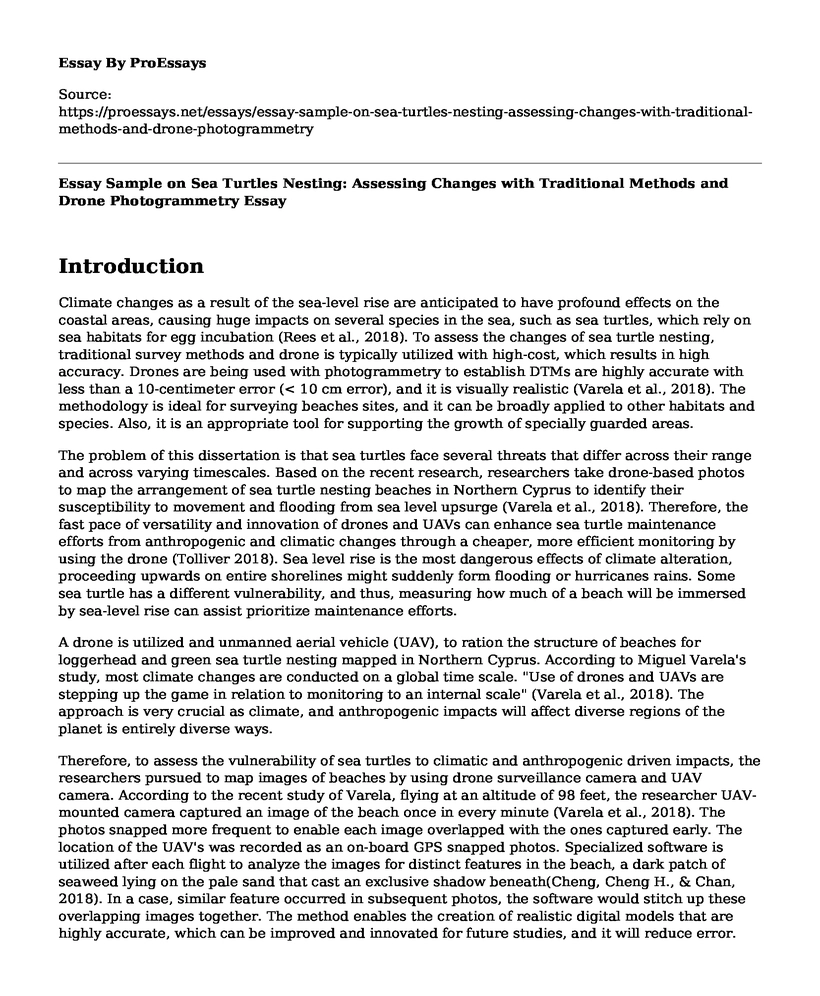Introduction
Climate changes as a result of the sea-level rise are anticipated to have profound effects on the coastal areas, causing huge impacts on several species in the sea, such as sea turtles, which rely on sea habitats for egg incubation (Rees et al., 2018). To assess the changes of sea turtle nesting, traditional survey methods and drone is typically utilized with high-cost, which results in high accuracy. Drones are being used with photogrammetry to establish DTMs are highly accurate with less than a 10-centimeter error (< 10 cm error), and it is visually realistic (Varela et al., 2018). The methodology is ideal for surveying beaches sites, and it can be broadly applied to other habitats and species. Also, it is an appropriate tool for supporting the growth of specially guarded areas.
The problem of this dissertation is that sea turtles face several threats that differ across their range and across varying timescales. Based on the recent research, researchers take drone-based photos to map the arrangement of sea turtle nesting beaches in Northern Cyprus to identify their susceptibility to movement and flooding from sea level upsurge (Varela et al., 2018). Therefore, the fast pace of versatility and innovation of drones and UAVs can enhance sea turtle maintenance efforts from anthropogenic and climatic changes through a cheaper, more efficient monitoring by using the drone (Tolliver 2018). Sea level rise is the most dangerous effects of climate alteration, proceeding upwards on entire shorelines might suddenly form flooding or hurricanes rains. Some sea turtle has a different vulnerability, and thus, measuring how much of a beach will be immersed by sea-level rise can assist prioritize maintenance efforts.
A drone is utilized and unmanned aerial vehicle (UAV), to ration the structure of beaches for loggerhead and green sea turtle nesting mapped in Northern Cyprus. According to Miguel Varela's study, most climate changes are conducted on a global time scale. "Use of drones and UAVs are stepping up the game in relation to monitoring to an internal scale" (Varela et al., 2018). The approach is very crucial as climate, and anthropogenic impacts will affect diverse regions of the planet is entirely diverse ways.
Therefore, to assess the vulnerability of sea turtles to climatic and anthropogenic driven impacts, the researchers pursued to map images of beaches by using drone surveillance camera and UAV camera. According to the recent study of Varela, flying at an altitude of 98 feet, the researcher UAV-mounted camera captured an image of the beach once in every minute (Varela et al., 2018). The photos snapped more frequent to enable each image overlapped with the ones captured early. The location of the UAV's was recorded as an on-board GPS snapped photos. Specialized software is utilized after each flight to analyze the images for distinct features in the beach, a dark patch of seaweed lying on the pale sand that cast an exclusive shadow beneath(Cheng, Cheng H., & Chan, 2018). In a case, similar feature occurred in subsequent photos, the software would stitch up these overlapping images together. The method enables the creation of realistic digital models that are highly accurate, which can be improved and innovated for future studies, and it will reduce error. The dissertation is my original work conducted by utilizing secondary sources. The study is not the first in this subject since several scholars have researched the use of drones and UAV cameras to monitor sea turtle conversation (Cheng, Cheng H., & Chan, 2018).
Conclusion
In conclusion, drone photogrammetry needs favorable weather and light conditions to capture photo accurately and collect them safely. The emergence of advanced technology will address this approach to be more efficient and reliable in the upcoming years.
References
Cheng, I. J., Cheng, W. H., & Chan, Y. T. (2018). Geographically close, yet so different: Contrasting long-term trends at two adjacent sea turtle nesting populations in Taiwan due to different anthropogenic effects. PloS one, 13(7), e0200063.
Rees, A. F., Avens, L., Ballorain, K., Bevan, E., Broderick, A. C., Carthy, R. R., ... & Mangel, J. C. (2018). The potential of unmanned aerial systems for sea turtle research and conservation: a review and future directions. Endangered Species Research, 35, 81-100.
Tolliver, K. J. (2018). Nesting Ecology of the Green sea Turtle and Nesting Success After a Tropical Storm Event at Playa Cabuyal, Guanacaste Province, Costa Rica (Doctoral dissertation, Purdue University).
Varela, M. R., Patricio, A. R., Anderson, K., Broderick, A. C., DeBell, L., Hawkes, L. A., ... & Godley, B. J. (2018). Assessing climate change associated sea-level rise impacts on sea turtle nesting beaches using drones, photogrammetry, and a novel GPS system. Global change biology. https://doi.org/10.1111/gcb.14526
Cite this page
Essay Sample on Sea Turtles Nesting: Assessing Changes with Traditional Methods and Drone Photogrammetry. (2023, Mar 25). Retrieved from https://proessays.net/essays/essay-sample-on-sea-turtles-nesting-assessing-changes-with-traditional-methods-and-drone-photogrammetry
If you are the original author of this essay and no longer wish to have it published on the ProEssays website, please click below to request its removal:
- Climate Refugees from Flooding in Bangladesh
- Response to Hurricane Katrina vs. Sandy
- Hatching Eggs Using an Incubator Paper Example
- FDR's Impact on National Parks: Protecting the Nation's Environment - Essay Sample
- Essay Example on Troy Maxson: A Man of Strength, Hard Work, and Imagination
- Planetgard: Reputational Risks & Environmental Impacts of Coffee Farming - Essay Sample
- Paper Example on Exploring New Jersey's Climate and Fauna: Bears Adapt to Fluctuating Temperatures







